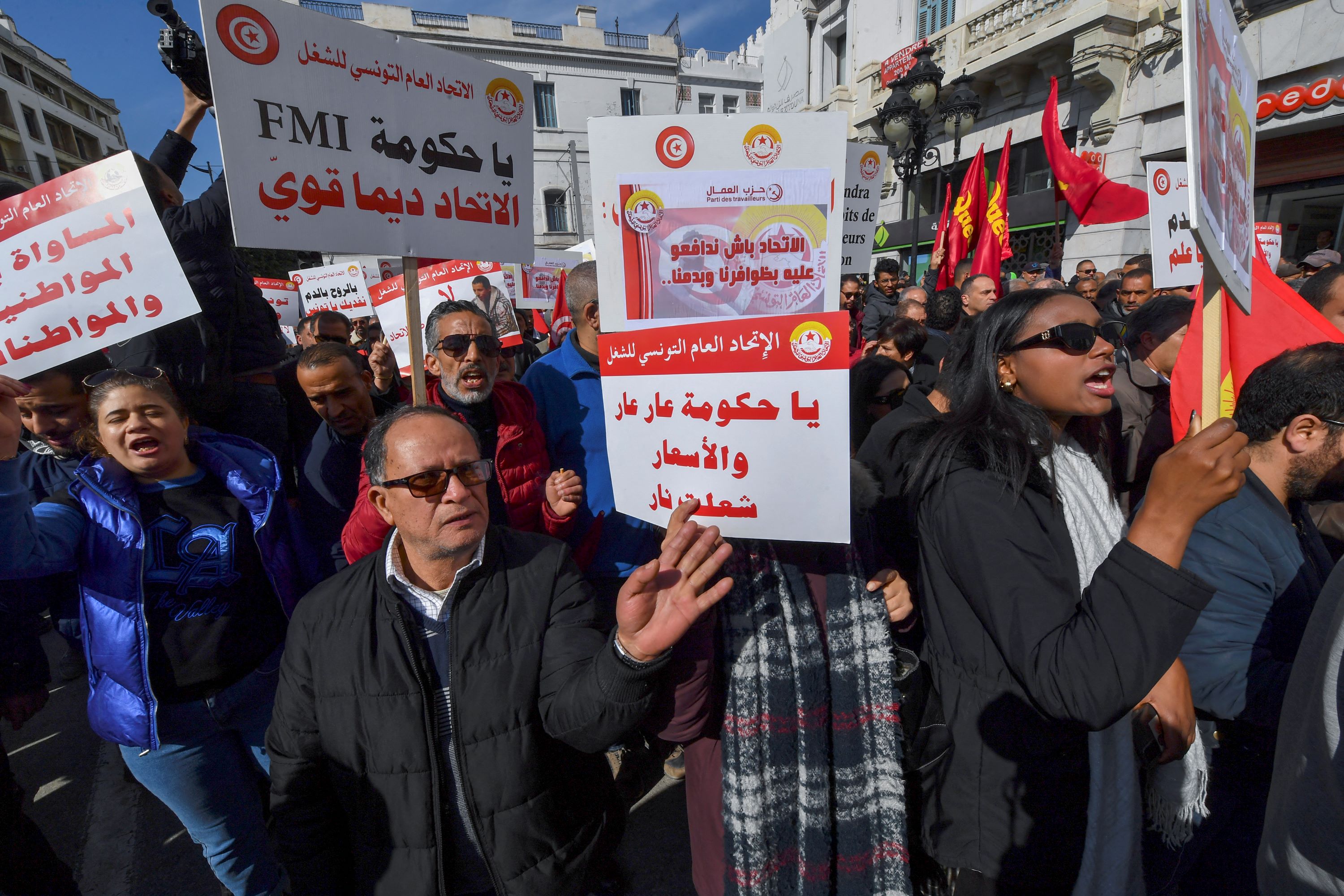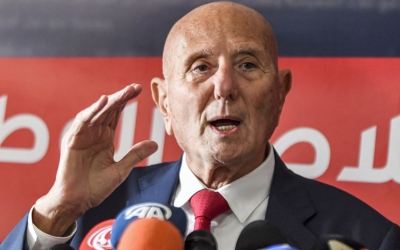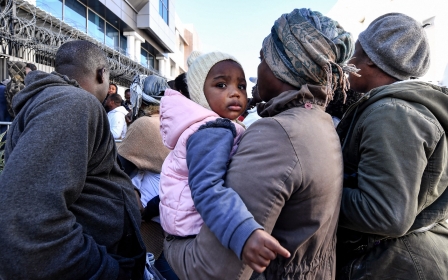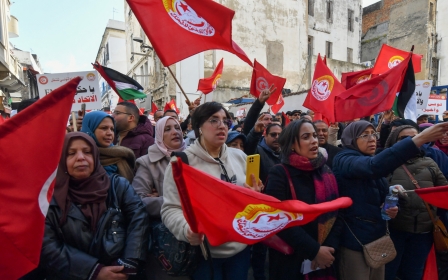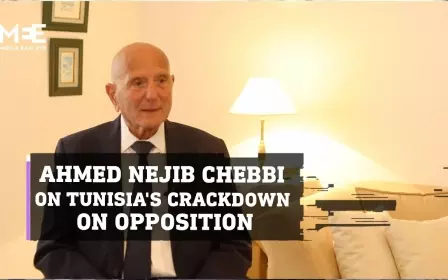Tunisia: Three things to know about the protests
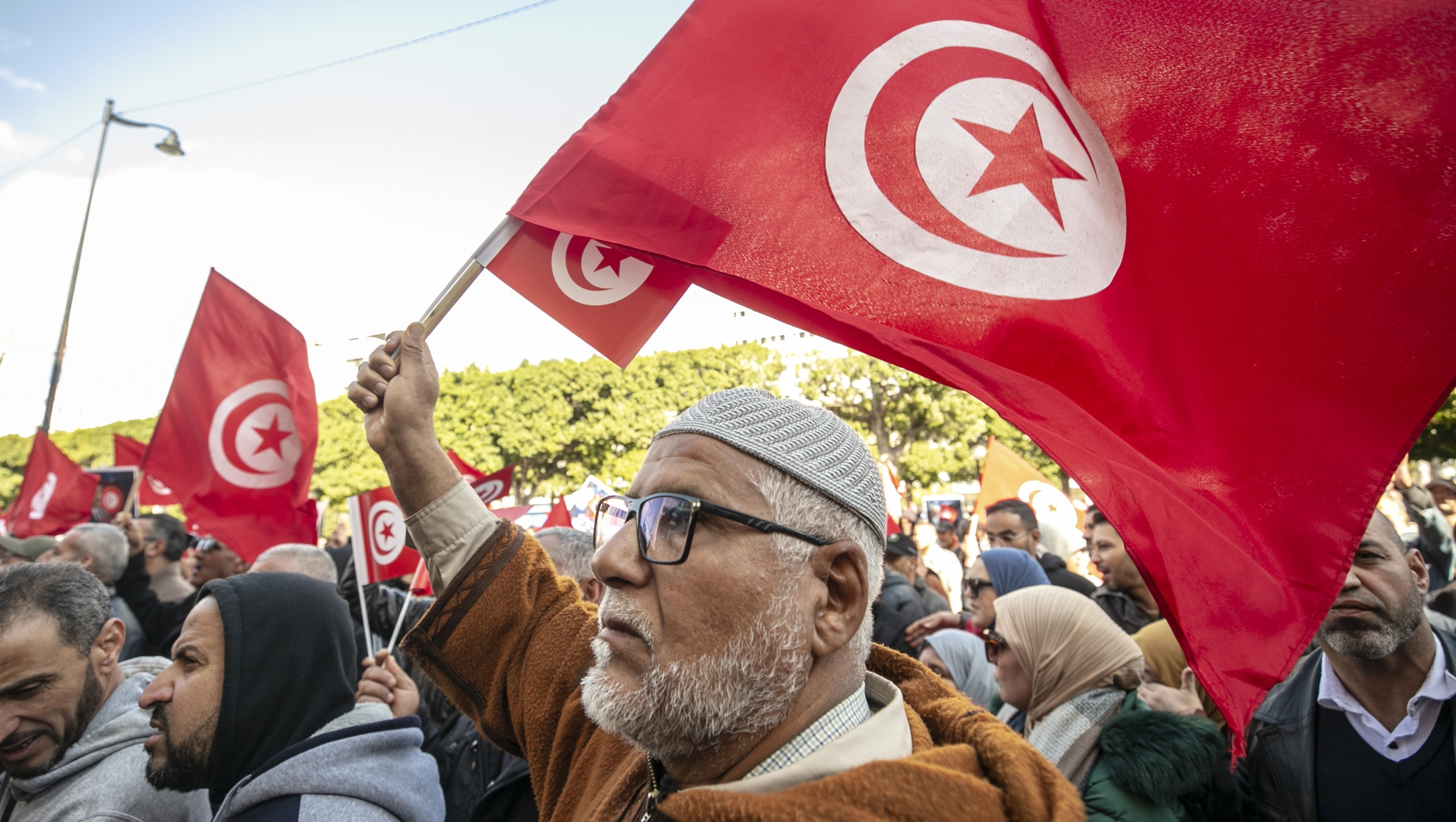
Tunisia has been a hotbed of turmoil for almost two years since President Kais Saied suspended parliament and grabbed a range of executive powers for himself in what opponents described as a coup.
Since that time, opposition politicians, campaigners and journalists have found themselves behind bars and dissent has been repressed. In the past two weeks, around 20 prominent politicial figures have been arrested.
At the same time, economic problems exacerbated by the Covid-19 pandemic, and Saied's controversial proposals to remedy it, have further stoked anger.
Over the weekend, thousands of Tunisians defied a ban on protesting to take to the streets in opposition to Saied's power grab.
Middle East Eye takes a look at what this latest round of protests are about, who's behind them and what's at stake.
New MEE newsletter: Jerusalem Dispatch
Sign up to get the latest insights and analysis on Israel-Palestine, alongside Turkey Unpacked and other MEE newsletters
What are the protests about?
The weekend saw two separate protests by different groups, but both had Saied's increasingly authoritarian rule in their sights.
Saturday saw more than 3,000 members of the Tunisian General Labour Union (UGTT) rallying in the capital Tunis. Protesters and speakers at the rally slammed the government's crackdown on opposition, including attempts to target the union itself.
"Freedom, freedom, down with the police state," chanted demonstrators, who also called for a "halt to impoverishment" in the country.
UGTT chief Noureddine Taboubi called for Saied to promote "dialogue" and "democratic" ways, and accused him of pursuing a "violent discourse... that is dividing the country". He also called for the release of Anis Kaabi, a top UGTT official for highway workers, who has been detained since February over his involvement in strike action.
Taboubi also told the rally that the union was opposed to any lifting of government subsidies on basic goods such as food and fuel, measures which have been suggested as necessary to secure a $2bn bailout package from the International Monetary Fund (IMF).
On Sunday, another demonstration was called by the National Salvation Front (NSF) alliance. Around 500 supporters gathered in the capital to denounce Saied's "coup", chanting "Freedom for detainees".
Among those they want released are opposition politician Jawhar Ben Mbarek; businessman Kamel Eltaief; Noureddine Boutar, the head of Tunisia's most popular radio station Mosaique FM; senior Ennahda party leader Said Ferjani and jailed trade unionists.
As NSF supporters gathered on Habib Bourguiba Avenue, reporters said a police officer could be heard shouting through a loudspeaker "please, the march is banned", and calling for them to disperse.
Ahmed Nejib Chebbi, head of the NSF, denounced the arrest of opposition figures as "arbitrary".
"We are defending a national cause and we will not stop until democracy and institutions return," he said, addressing the crowd.
Who is protesting?
The UGTT is one of the most powerful organisations in Tunisia and one of the few that can openly and effectively challenge government policies.
The union has around one million members - in a country of just over 12 million people - and shared a Nobel Peace Prize in 2015 with three other civil society groups for promoting national dialogue.
The NSF was founded in 2022 in response to Saied's power grab a year earlier. It's made up of a coalition of opposition parties that reject the president's measures, including the Ennahda party, which was previously the largest in the now-dissolved parliament.
Ennahda has been one of the main targets of Saied's crackdown, with numerous party officials jailed.
The alliance is led by Ahmed Nejib Chebbi, 78, a veteran political figure and founder of the Progressive Democratic Party, which later merged into the Republican Party. Chebbi withdrew from mainstream politics following the 2011 revolution until Saied's power grab.
His brother Issam Chebbi, head of the Republican Party, was also among those arrested in Saied's crackdown. Other arrested NSF members include Ghazi Chaouchi, Ridha Belhaj, Jouhar Ben Mbarek and Chaima Issa.
The UGTT and the NSF are not natural allies, and there has long been mistrust between the union and Ennahda, in particular.
However, with the mounting crackdown there appears to be a common front forming.
Speaking to Middle East Eye last week, Chebbi called for the different opponent factions to pool their resources and unite in opposition to Saied.
"Today's political time is not for factional demands," Chebbi said. "There is no possibility of addressing the economic crisis without capable political leadership.
"Therefore, it is necessary to... unite political and trade union forces to demand a national dialogue that will open the way for Tunisia's exit from the crisis."
What's at stake?
The arrest campaign that sparked the recent protests is the latest crackdown by the government on hard-fought freedoms brought about by Tunisia's 2011 revolution.
The crisis began in July 2021 when Saied - who won the presidential election in 2019 as an independent candidate - suspended parliament, dismissed the prime minister and assumed vast executive powers according to a plan revealed by Middle East Eye two months earlier.
Two months later, he declared that he would rule by decree, bypassing the powers granted to him in the constitution.
He then moved in on the country's judiciary, the independent election body and the anti-corruption authority, effectively stripping all three of their powers and limiting the system of checks and balances introduced by the post-revolution 2014 constitution.
Exactly a year after his power grab, Saied pushed through a new constitution that enshrined his one-man rule.
A new parliament was voted in December last year with fewer than nine percent of eligible voters casting the ballot, the lowest voter turnout in the country's history.
The power grab is also increasingly impacting many institutions and areas of civil society: from media freedom to anti-racism and trade unionism.
This article is available in French on Middle East Eye French edition.
Middle East Eye delivers independent and unrivalled coverage and analysis of the Middle East, North Africa and beyond. To learn more about republishing this content and the associated fees, please fill out this form. More about MEE can be found here.


